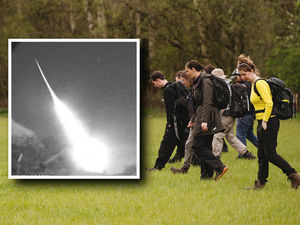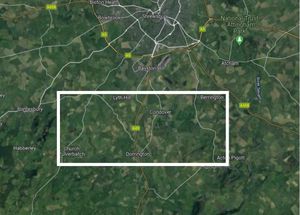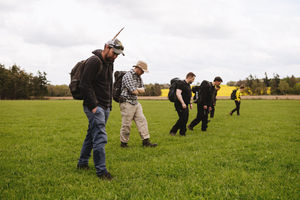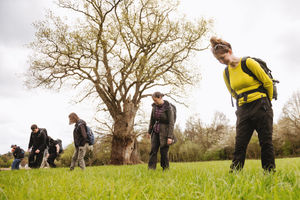Shropshire countryside searched for meteorite rock after huge fireball spotted
Experts are scouring the Shropshire countryside for meteorite rocks after a spectacular fireball was seen over the region.

Around 15 scientists and amateur meteor hunters have been searching for signs of a possible meteorite shower after the fireball lit up the sky late last Wednesday evening.
Planetary scientists from across the UK spent the Easter bank holiday weekend in Shropshire and were were searching in the Condover area on Tuesday afternoon.
They included representatives of the University of Glasgow, Manchester University, Plymouth University and staff from the Natural History Museum in London.
Co-ordinated by the UK Fireball Alliance, which represents space scientists and academics from across the country, they are also asking for the local communities help in the hunt for the rock.
Dr Luke Daly, a member of the The UK Fireball Alliance and lecturer in planetary geoscience at the University of Glasgow, is among those who have descended on Shropshire.

He said: “We think about 500 grams of meteorite survived to the ground in approximately four fragments just south of Shrewsbury. Given the amount of wheat and oilseed rape in the area, we have been literally looking for a needle in a haystack.
"Now the UK Fireball Alliance are asking people in the area if they’ve found anything interesting in their back gardens or driveways over the bank holiday weekend to let them know."
Dr Aine O'Brien, who also studies at the University of Glasgow, was part of the team that discovered the Winchcombe fall in the Cotswolds last year, where 600 grams of meteorite fell in the area.
It was the first UK meteorite fall for 30 years and was the first ever carbonaceous chondrite to be found in the UK.
She said: "We have satellite technology and all sorts of photographic equipment searching for these meteors and if there is a fireball it can be very accurate in detecting where it might have fallen.

"I was part of the team that found the meteorite rock and based my doctorate thesis on it as it is so rare in the UK, so this is very exciting and it has brought members of the UK Fireball Alliance and other groups to the area.
"If we don't find anything during this search we will come back later in the year but as has been said, I would urge people in the Condover and Dorrington areas to check the areas around their houses."
Anyone who lives in the area around the A49 south of Shrewsbury is being encouraged to keep their eyes peeled for dark shiny rocks in places they're not expected to be. Scientists are urging anyone who finds such a rock to avoid touching it with their bare hands to avoid contamination.
Professor Katie Joy, of the University of Manchester, added: "The meteorite won’t be hot and is as safe to handle as any other rock, but please don’t pick it up with your bare hands as that would contaminate the stone.

"It’s probably a glossy black or brown colour, maybe with the dark crust broken off in places. The largest pieces won’t be bigger than an Easter egg, and the smallest could be the size of a mini egg."
Members of the East Anglian Astrophysical Research Organisation (EAARO) also appealed for people across Shropshire to check their properties after being alerted to the fireball at around 12.45am last Wednesday.
The voluntary organisation respond to alerts and data collected by both American and English meteor groups who carry out regular research.
Managing director of EAARO Jason B Williams urged people to check their gardens for large, dark rock formations which could have caused damage to property or outbuildings.
Do you think you've found part of the meteor? Contact newsroom@shropshirestar.co.uk. Anyone who saw anything in the early hours of Wednesday morning can also get in touch with Jason at info@eaaro.org.uk and is urged to contact the Fireball Alliance with coordinates and photos at shropshire@ukfall.org.uk.




